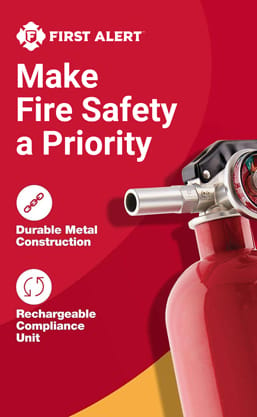While insulating your pipes is a good idea, insulation alone may not be enough to prevent bursting pipes from occurring in cold, wet weather. Shop Ace to find supplies like de-icing cables, like gutter heating cables and application tape to protect your home from frozen or broken pipes.
How Does Heat Tape for Pipes Work?
Heating tape is a heat cable that's encased with electrical wire. When plugged in, the pipe heater cable helps to regulate temperatures and prevent your pipes from freezing in cold weather.
Heat Tape Vs. Heat Trace Cable
People often use heat tape and heat cable interchangeably to describe a pipe heater cable designed to protect your home’s pipes from freezing. However, heat tape can also refer to application tape used to keep heat cables in place.
Heat tape for pipes is available in two primary forms: self-regulating and constant wattage. Although both self-regulating and constant wattage heat cables serve the same purpose, they differ in certain ways.
Self-Regulating Heat Trace Cables
Self-regulating heat cables have a special conductive core that becomes increasingly conductive during colder temperatures. In warmer conditions, the heat trace cable decreases its power output, making the core less conductive. While these cables regulate themselves to adjust to surrounding temperatures, they are unable to turn themselves completely on or off. Use a controller or thermostat to help control self-regulating pipe heating cables.
Constant Wattage Heat Tape
Constant wattage heat tape delivers the same wattage per lineal foot throughout the entire length of the cable. The consistent heat output is not influenced by temperature fluctuations, making it a great option for homeowners who want reliable protection against freezing, regardless of weather changes.
Where to Use Heating Cables
Use pipe heat cables on any metal or plastic water supplies and drainpipes that are vulnerable to freezing, including the following areas:
- Partially underground
- In crawl spaces and basements
- Underneath manufactured homes
- In outbuildings
Heat cables can also be used as de-icing cables for roofs and gutters. When ice dams form, melting snow and ice can cause water pooling on walkways below. Extensive snow and ice buildup can also subject roofs to extensive damage. Prevent the risk of roof and gutter ice dams from forming by installing a heat deicing cable specifically designed for roofing systems.
How to Install Pipe Heating Cables
After wrapping your pipes with heat tape, add extra stability by securing the heating cable with cable application tape rated for varying temperatures so it won't lose its adhesive properties. It is important to not overlap the heating cable to prevent a hot spot from occurring in any one location to avoid burst pipes or home fires.
If it’s your first time installing heating tape for pipes, consider hiring a professional to ensure the job is done right.
How to Install Roof Heating Cables
Roofing heat cables are extra long to accommodate most roof and gutter configurations. A roof heat cable kit typically includes roof clips and cable spacers for easier installation. The cables should be plugged into a GFI grounded outlet. Installation is recommended when it's dry outside and safe to work from a ladder.
Find Heat Tape for Pipes Near You at Ace Hardware
When temperatures begin to plummet, protect your pipes and roof against freezing with the assortment of heat cables near you at Ace Hardware. Then, shop other heating and cooling essentials—like water pipe thermostats and other heating supplies—to stay prepared throughout the year, from heaters and heating supplies come winter to air conditioners, AC parts and air filters for warmer weather.

























